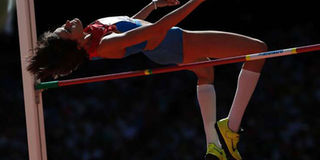Russia to teach anti-doping in schools

Russia's Anna Chicherova competing in the women's high jump athletics event at the 2015 IAAF World Championships at the "Bird's Nest" National Stadium in Beijing on August 27,2015. Russian high jump Olympic champion Chicherova on May 25, 2016 vowed to clear her name after testing positive for doping at the 2008 Beijing Olympics. Russia is to start compulsory anti-doping classes in schools as part of a campaign to stamp out cheating in sport. PHOTO |AFP
What you need to know:
- Anti-doping lessons will be followed by "additional training for doctors and medical personnel, coaches and employees of sport federations".
- Russia's anti-doping agency RUSADA will develop a special curriculum, based on World Anti-Doping Agency guidelines.
MOSCOW
Russia is to start compulsory anti-doping classes in schools as part of a campaign to stamp out cheating in sport, authorities announced Monday.
With the country furiously lobbying to overcome a ban on its athletes in time for the Rio Olympics, the lessons will be part of new measures, drawn up with the Council of Europe, "to reform social attitudes to doping", the sports ministry said in a statement.
Russia has been hit by a series of doping scandals, still under investigation, that led the International Association of Athletics Federations (IAAF) to suspend Russia from international competition.
"Lessons on anti-doping will be rolled out as part of the curriculum in schools across the country," in line with physical education classes, to reach millions of children, the sports ministry said.
The ministry said that before the lessons start, there will be anti-doping classes for "all higher education institutions for professionals in the fields of sport and medicine".
This will be followed by "additional training for doctors and medical personnel, coaches and employees of sport federations".
Russia's anti-doping agency RUSADA will develop a special curriculum, based on World Anti-Doping Agency (WADA) guidelines, for the 3,000 sports schools where the country's elite athletes train.
"We recognise that to create real change we must inform athletes from the very beginning of their careers," said Natalya Zhelanova, advisor to Sports Minister Vitaly Mutko on anti-doping issues.
FIGHTING DOPING
"It is about instilling the right values from the outset, but we hope this initiative will be supported by wider society as this is a change that all Russians must embrace," the statement quoted her as saying.
Previously announced anti-doping measures include appointing international experts to assist with reforms and a minimum of three additional "independent, externally administered anti-doping controls" for athletes hoping to compete in Rio.
World champion hurdler Sergey Shubenkov, who clocked a national record of 12.98 seconds to win gold in the 110m hurdles at the 2015 World Championships, said Russian athletes already see the difference in their country's approach to fighting doping.
"Anti-doping control officers come to my house more often for out-of-competition testing," Shubenkov told AFP. "They used to come once every two to three months and now they come every month."
With Russia's presence in Olympic track and field at stake, the IAAF is to meet on June 17 to decide whether to reinstate the Russian athletics federation.
The federation was provisionally suspended in November after a Wada independent commission that found evidence of state-sponsored doping and mass corruption in Russian athletics.
Mutko said last month that Russia would not include athletes who in the past had committed "gross violations of anti-doping rules" on its Olympic team.





